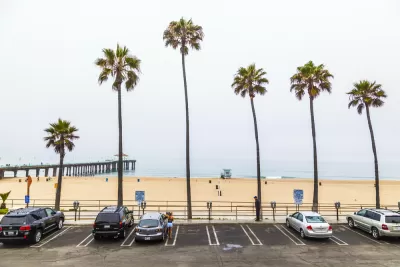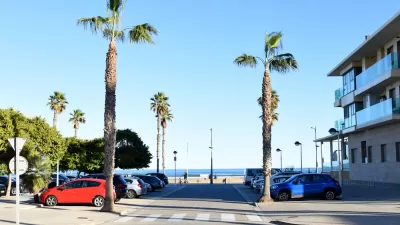Ride hailing reduces the need for parking services, as well as parking spaces, and parking companies are feeling the effects. New data comes from a major U.S. parking management company based in San Diego, thanks to the Union-Tribune.

"Homegrown Ace Parking — one of the largest parking companies in North America and also a fixture in San Diego’s political and business scene — is feeling the impact from Uber and Lyft," reports Jeanette Steele, who covers growth and development for the San Diego Union-Tribune, on Feb. 22.
The impact of patrons opting not to drive their own vehicles to downtown establishments as well in outer locations is not uniform. Some businesses are affected more than others.
At San Diego hotels serviced by Ace Parking, overnight parking has declined 5 percent to 10 percent. At restaurant valet stands, business is down 25 percent.
And, most dramatically, nightclub valets are seeing a 50 percent drop off.
While the news is not good for those who make their living as valets, it is good news for downtowns with limited parking, as valets are no longer competing for on-street and off-street parking.
In downtown San Diego, city planners are looking at the decline as they update parking guidelines — which could lead to changes in how much future parking is built.
San Diego is hardly alone in potentially reducing minimum parking requirements, reports David Z. Morris on the San Diego parking data for Fortune on Feb. 24.
Even back in 2015, cities were already relaxing zoning requirements that set minimum parking allotments, and there are now even more signs that city planners are thinking differently about parking. Perhaps most dramatically, a new Major League Soccer stadium being planned for David Beckham’s Miami expansion team may include no new parking at all – but will have designated pickup zones for Uber and Lyft.
"As goes San Diego, so do other metropolitan areas, said Ace managing partner Keith Jones," adds Steele. "Ace Parking has seen similar declines at its 750 parking operations from Washington, D.C., to Portland, Oregon."
However, drop-offs and pick-ups also can have a negative impact on traffic circulation, as many bicyclists using non-protected bike lanes will testify. So more cities are replacing street parking spaces with drop-off zones for ride-hailing companies.
Steele describes new strategies, mainly using technology, that Ace is using to protect their business from the ride-hailing competition. As for economics, it's good for their customers, i.e., those driving their personal or rental cars. Jones and parking expert Casey Wagner, who hosts a National Parking Association webinar on the rise of the shared economy, agree that the ride-hailing competition will force parking companies to reduce their prices.
Hat tip to Steve Birdlebough.
FULL STORY: Ace Parking says Uber, Lyft have cut parking business up to 50% in some venues

Maui's Vacation Rental Debate Turns Ugly
Verbal attacks, misinformation campaigns and fistfights plague a high-stakes debate to convert thousands of vacation rentals into long-term housing.

Planetizen Federal Action Tracker
A weekly monitor of how Trump’s orders and actions are impacting planners and planning in America.

San Francisco Suspends Traffic Calming Amidst Record Deaths
Citing “a challenging fiscal landscape,” the city will cease the program on the heels of 42 traffic deaths, including 24 pedestrians.

Defunct Pittsburgh Power Plant to Become Residential Tower
A decommissioned steam heat plant will be redeveloped into almost 100 affordable housing units.

Trump Prompts Restructuring of Transportation Research Board in “Unprecedented Overreach”
The TRB has eliminated more than half of its committees including those focused on climate, equity, and cities.

Amtrak Rolls Out New Orleans to Alabama “Mardi Gras” Train
The new service will operate morning and evening departures between Mobile and New Orleans.
Urban Design for Planners 1: Software Tools
This six-course series explores essential urban design concepts using open source software and equips planners with the tools they need to participate fully in the urban design process.
Planning for Universal Design
Learn the tools for implementing Universal Design in planning regulations.
Heyer Gruel & Associates PA
JM Goldson LLC
Custer County Colorado
City of Camden Redevelopment Agency
City of Astoria
Transportation Research & Education Center (TREC) at Portland State University
Jefferson Parish Government
Camden Redevelopment Agency
City of Claremont





























